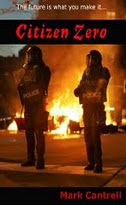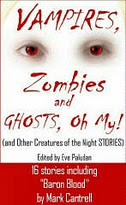
A Novel By Mark Cantrell
The following is an extract of my latest novel, extracted as an introductory taster. I regard it as an 'accidental novel' since it was originally intended to be a short story. Clearly, it had something to say and wasn't prepared to let up until it had hammered its point into my head...
At the time of posting, the manuscript is still in the final stage of completion. The final manuscript is finished and is undergoing the last stages of revision to create the author's final draft. After that, well who knows what the fickle world of publishing might formulate...
After the novel, begins the hard work. For now, take a journey "In Workers' Paradise".
WHEN I was a boy, the world was different.
Things do change, we all understand that now, of course, though I never expected to play a part in it. Like my father, and his father before him, I assumed that my life was destined to follow a similar path. And, like them, I would in time bequeath my lot to my own sons. It didn’t work out like that: not in the end.
Looking back, I suppose it’s because I was different. Don’t ask me how or why; such considerations are long past relevance, but even so I sensed something was wrong with the world that I wasn’t then capable of expressing. I was always one for curiosity and wonder, something of a daydreamer my parents said. Often, I felt out of place, but in those days I was unaware that the seeds of such frustration were sown by the limitations of my birthright.
For a while, though, I was allowed to be a child, freed by the grace of ‘not knowing any better’. They were a few brief years of wonder, of a dependant’s optimism, of a child’s wilful questioning of the state of being, before the demands of adult responsibility caught up with my precocious spirit. There’s a motor there, however ill-formed, however fragile, that only time and experience – and luck – can convene against the consensus of mediocrity.
Yes, I believe I was quite a burden to my parents at times, though I like to think they were proud of me, even if they aren’t here any more to say ‘well done, son’. In truth, I think they would be horrified by what I have become and by what I did to reach this place of reflection: they were ever a product of their time. Still, parental approval hardly rates as a major consequence in my life.
Never did, really.
They did their best, according to the manner of the times, but I was wayward, I suppose, in my own way. It showed early, this cross-cut grain in my soul – but I wouldn't be where I am today without these peculiar traits. Perhaps none of us would be.
‘A Hovis Boy, Born & Bred’
EVEN after all these years, I remember it clearly. I was about nine, still a carefree schoolboy, when my father first took me to his place of work. He was thinking, I presume, of preparing me for the days of adulthood, when I would come to share the responsibilities he had carried for so long.
He put his left arm on my shoulder, and with his right arm gestured expansively at his domain. “One day, son, all o’ this will be yours.”
There was pride in his eyes. Pride at what he was. Pride that he had a son to follow in his footsteps. Some didn't. Some died before they sired a replacement. I tried to appear willing, just for his sake, and pretend to be impressed, but it wasn’t easy. The grubby workstation was literally my father’s post in life. One of many making the line, it was grease-smothered and dirty. The touch screens were badly wiped and blurred by patches of shining smear. The whole factory stank of ozone and burnt bio-fuel, together with the uneasy smell of those organic blobs that were the nanochines.
A reflection distracted me easily from my father's pride. Moving like an elegant ghost, it flitted across the station’s shiny screen. The apparition captivated my attention. I turned my eyes from the display to look up to the catwalks high overhead. Up there, where the air from the mill's skylights was fresher, I saw them for the first time; certainly it's my earliest conscious memory of the creatures that would have such an important role in shaping my future. There were two of them; dressed in their fine clothes, they walked with a dignified disdain as they looked down upon our world.
The capitalists.
That’s when I gained the first glimmer of our world’s form, but I didn't see it ion those terms. Not then. No, I wanted to know what it was like to be up there alongside them, to be one of them: to stand above it all. Even then, a mere slip of a lad, I knew I was destined for better things. A little voice inside told me as much. I confess as my eyes glanced at my father's station, its tone was tinged with horror.
The smell of grease and ozone stayed with me on the walk to the schoolhouse afterwards, and for the rest of the day. If I think hard enough, I can smell it even to this day. My father perished with that stench in his nose.
I think he died proud of me, all the same, even if he took the silent sentiment to the Reclamatoria. A son knows these things, don't you think?
THEY looked grand. The capitalists.
Graceful creatures, they were, in their top hats and tails, walking calm with their canes tapping their measured pace through the streets of the Conclave. Beneath the finery, you could tell their physiques were strong and athletic – the very peaks of perfection. They surveyed the main square, seemingly oblivious to the interest and adoration they stirred from we inhabitants. They were looking to make the place better for us, I remember my Dad telling me. Poor father; he was a kindly and simple man at heart.
Behind the capitalists, a gaggle of men in white coats tapped notes into their data-tablets. The first top hat paused and pointed with his cane. A brief conversation followed, and whatever they had discussed was recorded on an adjutant’s tablet.
I watched; just another snot-nosed kid among the boys and girls of Hovis, surrounded by the adoring adults, themselves gawping at the procession in child-like wonder. The capitalists were so tall and bright in the sun, so elegant and graceful. They appeared every bit the Lords of Nature and Men we imagined them to be; entrusted with our care and well-being, it was a duty they provided with unswerving dedication – of that we were certain in our simple way.
Oh, how I wanted to become one of them when I grew up and assume that wilful mastery of destiny – and to serve the Conclave from the ascended position I felt was my due. I was fool enough to say so in front of my peers – and the adults – much to the shame it caused me. Naturally, some of the boys jeered.
“You? A capitalist!”
I jabbed one in the ribs and was ready to wrestle him on the cobbles right there and then. I’d show the capitalists how masterful I was – but my mother appeared from the crowd with a hand that stung my ear a ringing slap. Still, not as sharp as her tart voice.
“That’s blasphemy! You hold your tongue or I’ll dumb it with vinegar and carbolic, my lad!”
I didn’t argue, just hung my head and scowled at the sniggering oafs I counted as friends and playmates.
“You know your place,” she added, with all the scolding heat of a mother’s worry. I sulked a little more and gazed longingly at the gaggle of capitalists.
One of them returned my fascination. He had watched us with a hint of amusement in his handsome features; just then he was staring at me. I felt a thrill of pride and embarrassment to be singled out for his attention, as if I’d been noticed, but the hungry fire in his eyes did unnerve me. Well, still a boy and suddenly the centre of such attention, what else can you expect?
Then his tongue slithered out to taste the air. Forked. Much like a serpent’s. My jaw fell open in fascinated horror and I forgot all the wounded pride and humiliation of my public chastisement. The capitalist moved on, sharing a brief joke with his fellow ubers and laughing at the reaction he had provoked in a small, bewildered boy.
They did look so fine, though, walking casually in the sun. I didn’t understand why I couldn’t be one of them. Right then, there was no hardship, no sacrifice I wasn’t prepared to make to earn my place among them. Little then did I realise my world had been constructed so meticulously to shuffle me into my father’s place, and away from the lofty heights of such grandeur.
No, I wondered in my childish way if it was because I lacked such a forked tongue… For a while I even contemplated taking a stanley knife to my oral appendage, but the thought of the pain and the blood put me off.
I might have been wayward, but I wasn’t insane.
“THAT’S socialist talk that is,” my mother declared in her Sunday Best stern. “If you’re not careful, my lad, I’ll wash your mouth out with carbolic and send you to bed – old as you are!”
That was the first time I heard the word ‘socialist’ – I had no idea what it meant. I was going on for 12, approaching the end of my school years and hence childhood: the time to begin the transition to adulthood and be ‘prenticed. My parents – especially my mother – still worried that I was leaving none of my childish ways behind. I persisted in my ambition to become a capitalist. I still asked ‘precocious’ questions. I still fantasised and daydreamed, as it was called. I was unsettled with my lot in life, though I was still unable then to give any real articulation to my frustrations.
“Go easy on t’ lad,” my father said, still prepared to tolerate some of my flights of fancy. “He’s too young to understand these things. He’ll learn. He’ll grow out of it. Anyway, he only said he wanted to be one. Daft as it is.”
“But this nonsense! He ought to be thinking of earning his bread and butter – who’ll look after him when we’re gone? How will he look after us when we’re too old to earn? Be like the capitalists indeed! Who put that nonsense in your head?”
I hung my head and mumbled ‘nobody’.
“Now you listen to your mother,” my father added kindly. “Your mother’s right. Them nobs is a better breed o’ people. It’s nature, see. You can be no more one of them than can a horse or a dog be a man. Can you sort out all t’ world’s problems? Can you fathom organisin’ things and seein’ to it that food an' stuff is shipped halfway round the globe so’s we don’t go hungry? Do you know how to make that ‘fangled ‘chinery I work?”
I shook my head and played with my bread.
“No. ‘Course not. They’s bred for it. They’s special. It’s in t’ blood. There’s a place for everyone, see. We got ours, they got theirs. I got mine and in time you’ll have yours.”
“And be grateful for it!”
“Aye!”
“Why?”
A laugh from my dad and he ruffled my hair. I scowled, but my dad only laughed some more.
“They give us work,” he said once his mirth had settled down. “What do you think put the food in your belly, or the house we live in. Capitalists do that for us. They give us jobs, so we can earn our keep. They built t’ Conclaves. They provide for us. And when you gets your own job, you’ll provide for your family. We owe ‘em? What could we be wi’out ‘em, eh?”
“I suppose.”
I still wanted to be tall and blond and athletically handsome in my fine clothes; walking and pointing with my cane, turning the girls’ heads. Though I didn’t know why I wanted the last one, of course, not then, at that age. Except for my Mam, I still thought girls weren’t up to much, even if I did crave their attention.
We finished our tea in silence. My dad munched through his toast. I’d learned an important lesson, though; it’s not always wise to speak your mind. It was to set me in good stead later in life – when our ordered and timeless lives were so rudely overturned.
ENDS
Mark Cantrell,
Stoke-on-Trent,
25 June 2008
Copyright (C) June 2008. All Rights Reserved.
Category: FICTION



























1 comments:
Since posting this extract, I have experimented with HarperCollins' new Authonomy site and posted a longer extract there. You can read it HERE
Post a Comment